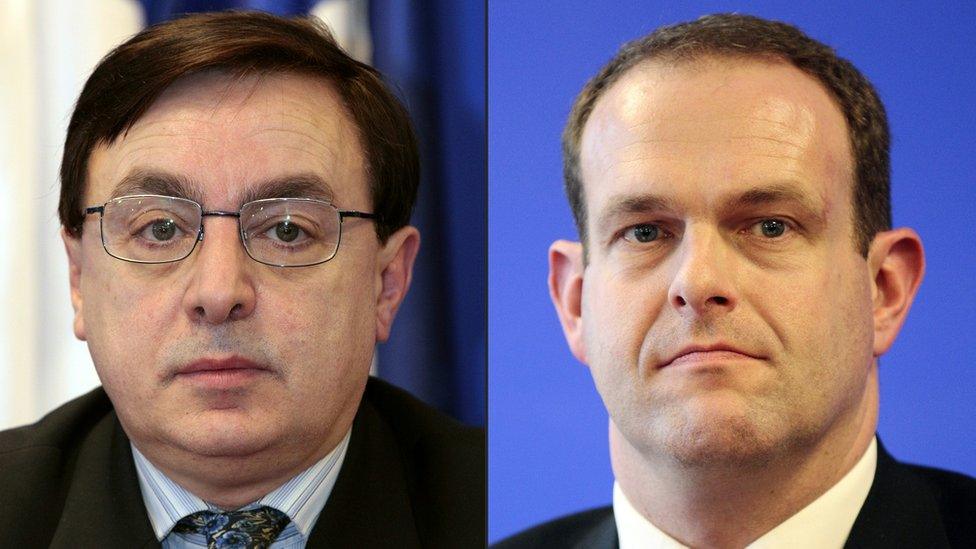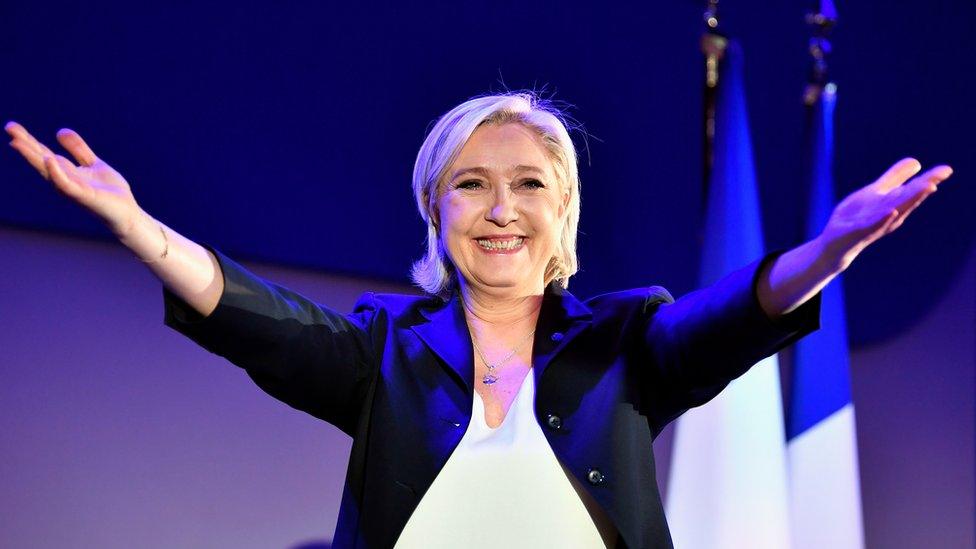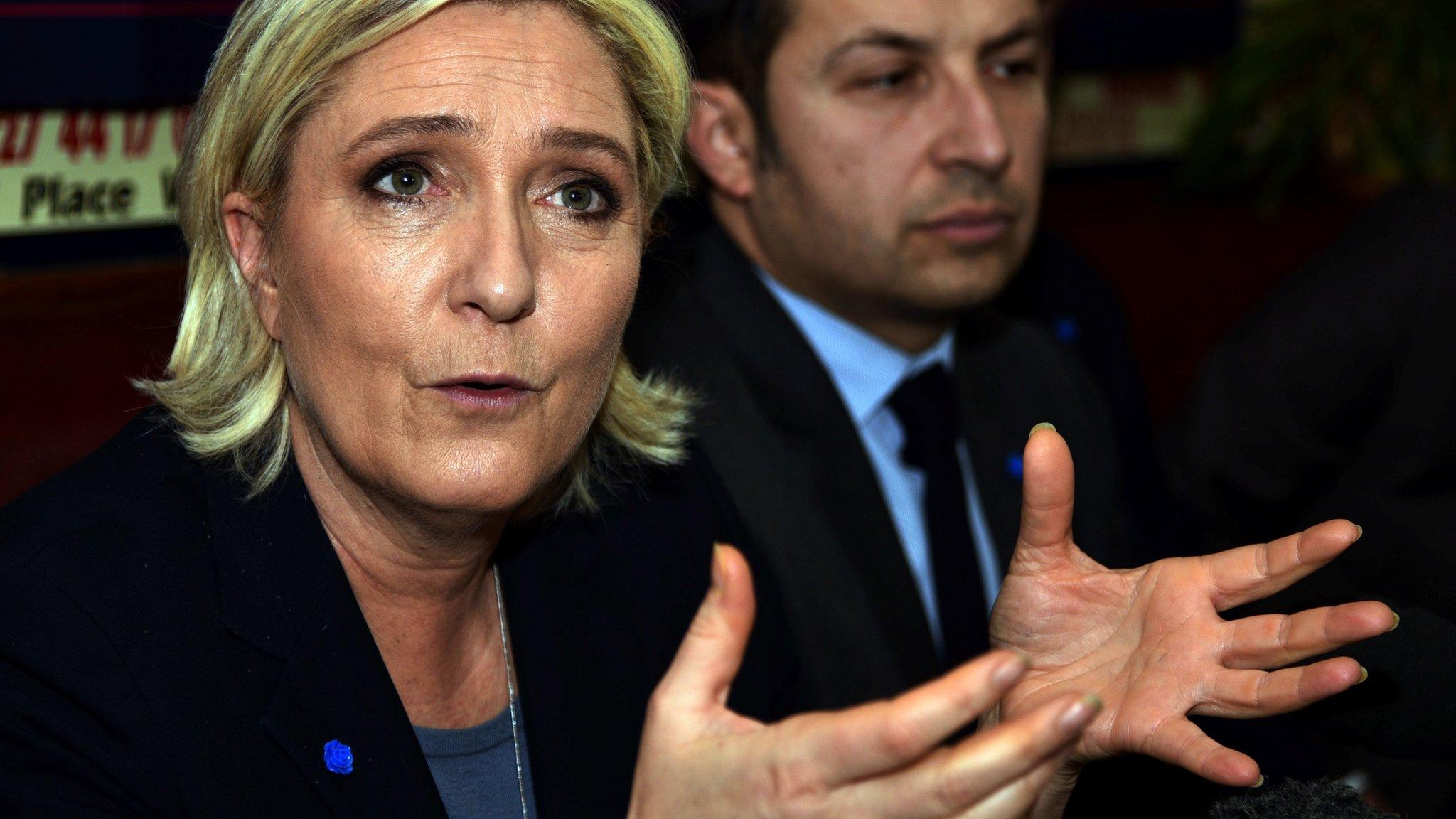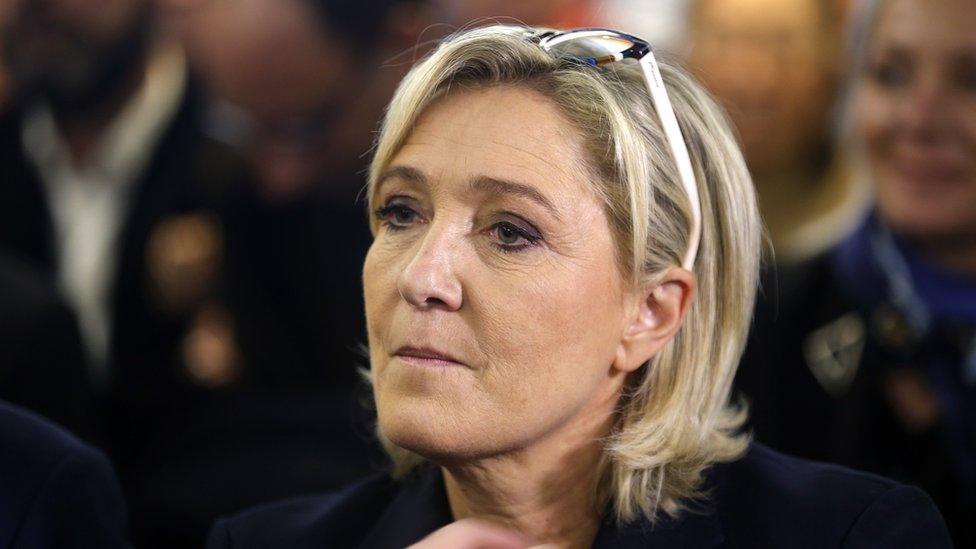France election: New far right leader quits in Holocaust row
- Published

Jean-François Jalkh, left, is being replaced by Steeve Briois after only three days at the helm
France's far-right National Front (FN) has replaced its leader for the second time in three days after a row erupted about Holocaust denial.
Jean-François Jalkh had been named as the interim president on Tuesday after Marine Le Pen stepped aside to fight for the French presidency.
Mr Jalkh denies claims that in past remarks he questioned the reality of Nazi gas chambers.
He is being replaced by Steeve Briois, one of the party's MEPs.
Like Mr Jalkh, Mr Briois is also one of the party's five vice-presidents. He is mayor of the National Front-run town of Henin-Beaumont in northern France.
"Mr Briois will take over the interim leadership and there'll be no more talk about it," fellow FN vice-president Louis Aliot - who is also Ms Le Pen's partner - told BFMTV news channel.
It is an unwelcome development for Ms Le Pen, who has worked hard to distance her party from its anti-Semitic roots - expelling her father from the party he founded over his comments that the gas chambers were a "detail of history".
On Friday, Jean-Marie Le Pen waded into the controversy again, saying that a speech at a memorial for gay policeman Xavier Jugelé, who was killed by a gunman, had "exalted" the concept of gay marriage. The speech was given by Mr Jugelé's widower.
Ms Le Pen herself drew strong criticism on 9 April when she suggested France was not responsible for a 1942 wartime round-up of 13,000 Jews, who were sent from France to Nazi death camps.
In a coincidental twist, Ms Le Pen's rival for the presidency, Emmanuel Macron, on Friday visited the village of Oradour-sur-Glane, where Waffen-SS troops murdered 642 people in June 1944 in the worst Nazi massacre in occupied France.

%
Emmanuel Macron

%
Marine Le Pen
Please enable Javascript to view our poll of polls chart.
Opinion polls taken since the first round on Sunday suggest Mr Macron, candidate of the En Marche (On The Move) movement, will easily beat Ms Le Pen in the second round on 7 May.
The majority of their former rivals have backed Mr Macron, although right-wing politician Nicolas Dupont-Aignan, who won 5% of the vote, has urged voters to switch their support to Ms Le Pen.
Meanwhile, Jean-Luc Mélenchon, who won 20% of the vote in the first round, has declined to back either, telling his supporters they can make their own minds up, dismissing the run-off as a contest between extreme finance and the far right.
Pollsters have suggested that high levels of abstention by would-be Macron supporters or an unexpected event could upset the predictions.
'Technically impossible'
In a move widely decried by her critics as a stunt, Ms Le Pen announced she was temporarily stepping aside as FN leader on Monday. She said she wanted to remain "above partisan considerations" as she campaigned for 7 May.
But when Mr Jalkh was announced as her replacement on Tuesday, excerpts surfaced of an interview conducted with academic Magali Boumaza in 2000 in which Mr Jalke questioned whether the Nazis had used the cyanide-based pesticide Zyklon-B in the gas chambers.
"I consider it technically impossible - I repeat, impossible - to use it... in mass murder," Le Monde , externaldaily (in French) quoted him as saying. "Why? Because you have to wait several days before you can decontaminate a place where Zyklon B was used."
He also praised the "seriousness and rigour" of arguments put forward by Robert Faurisson, who has multiple convictions for Holocaust denial.
Mr Jalkh denies making these remarks.
"He feels that the climate is not conducive for him to carry out this interim role," Mr Aliot told BFMTV.
"He wants to defend himself and he will be filing a legal complaint because he feels that his honour has been attacked and I can tell you that he firmly and formally contests what he is accused of."
- Published2 May 2017

- Published1 February 2017

- Published10 February 2017
